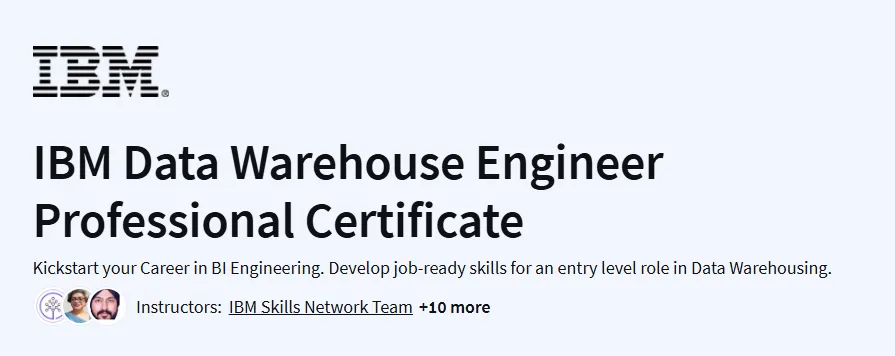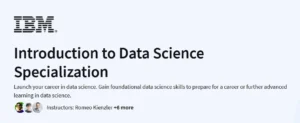What you will learn in IBM Data Warehouse Engineer Professional Certificate Course
- This professional certificate program is designed to equip learners with essential skills in data warehousing and business intelligence.
- Participants will gain hands-on experience with relational database management systems (RDBMS) such as MySQL, PostgreSQL, and IBM Db2.
- The curriculum covers composing and executing SQL queries, deploying and managing databases, creating data pipelines using tools like Apache Airflow and Kafka, and designing data warehouses.
- Additionally, learners will utilize business intelligence tools like Cognos Analytics to analyze and extract insights from data.
Program Overview
Introduction to Data Engineering
⏱️ 3 weeks
This course provides an overview of data engineering concepts and the role of a data engineer.
Understand the data engineering ecosystem and lifecycle.
Explore various data repositories and data processing systems.
Learn about data ingestion, transformation, and loading processes.
Relational Database Management Systems (RDBMS)
⏱️ 3 weeks
This course focuses on relational databases and SQL.
Learn to design and implement relational databases.
Compose and execute SQL queries to retrieve and manipulate data.
Understand normalization and database design principles.
ETL and Data Pipelines with Shell, Airflow, and Kafka
⏱️ 4 weeks
This course covers the creation of data pipelines for ETL processes.
Use shell scripts to automate data processing tasks.
Implement workflows using Apache Airflow.
Stream data using Apache Kafka.
Data Warehousing and BI Analytics
⏱️ 4 weeks
This course delves into data warehousing concepts and business intelligence.
Design and populate data warehouses.
Utilize business intelligence tools like Cognos Analytics to create reports and dashboards.
Analyze data to extract actionable insights.
Get certificate
Job Outlook
- The demand for data warehouse engineers is growing as organizations increasingly rely on data-driven decision-making.
- Proficiency in data warehousing and business intelligence tools opens opportunities in roles such as Data Warehouse Engineer, Business Intelligence Analyst, and Data Engineer.
- According to industry reports, the data engineering field is expected to see significant growth, with numerous job openings and competitive salaries reflecting the specialized skill set required.
Specification: IBM Data Warehouse Engineer Professional Certificate
|
FAQs
- The program is designed for beginners, requiring no prior experience in data engineering or programming.
- It provides foundational knowledge in data warehousing, SQL, and business intelligence tools.
- The curriculum introduces tools like Apache Airflow, Kafka, and Cognos Analytics from scratch.
- Hands-on projects and exercises reinforce learning and build practical skills.
- The course is self-paced, allowing learners to progress according to their schedule.
- MySQL, PostgreSQL, and IBM Db2: Work with relational database management systems.
- SQL: Compose and execute queries to retrieve and manipulate data.
- Apache Airflow: Automate workflows and manage data pipelines.
- Apache Kafka: Stream data for real-time processing.
- Cognos Analytics: Utilize business intelligence tools for data analysis and visualization.
- The program consists of four courses, with an estimated completion time of 14 weeks at 10 hours per week.
- The courses are self-paced, allowing learners to start and finish at their convenience.
- Access to course materials is available for a specified period after enrollment.
- Learners can accelerate or slow down their learning based on personal schedules.
- The program is designed to be flexible, accommodating working professionals and students.
- Completing the certificate prepares you for roles such as Data Warehouse Engineer, Business Intelligence Analyst, and Data Engineer.
- The program provides hands-on experience with industry-standard tools and techniques.
- The certificate is recognized by employers and can enhance your resume and LinkedIn profile.
- Salaries for data engineering professionals range from $70,000 to $110,000 annually in the U.S.
- The program’s practical approach equips learners with skills applicable to various industries.
- The course includes hands-on labs and projects that simulate real-world data engineering tasks.
- Projects cover areas such as data pipeline creation, database management, and data analysis.
- The capstone project allows learners to apply their skills to a comprehensive data engineering solution.
- Exercises are designed to reinforce learning and provide practical experience.
- Completing these projects can help build a portfolio to showcase your skills to potential employers.





